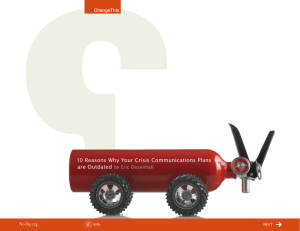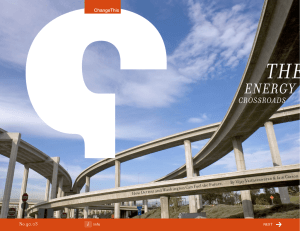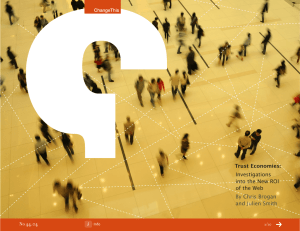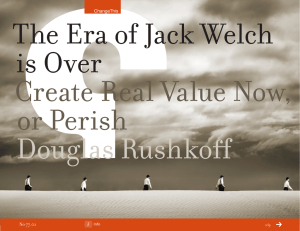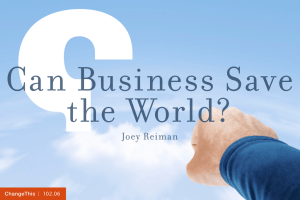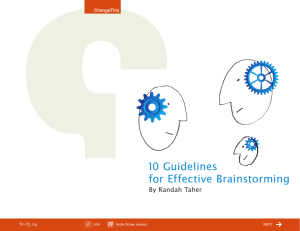THE A RT OF SIGNIFIC A NCE Dan Clark, |
advertisement
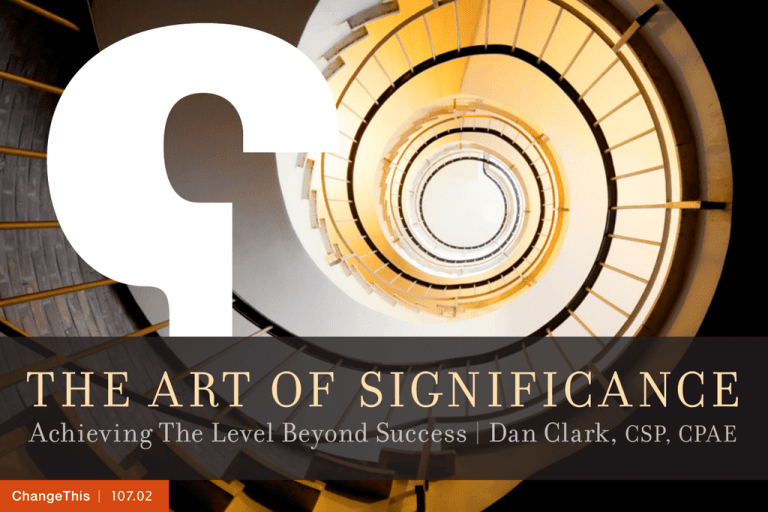
THE A RT OF SIGNIFIC A NCE Achieving The Level Beyond Success | Dan Clark, CSP, CPAE ChangeThis | 107.02 We achieve success by doing what is necessary to get what we want, but often end up in a completely different physical and emotional place than we thought we would be. It’s like the pilot who took off at the equator to circumnavigate the globe. Because his course was off by just one degree, by the time he returned to the same longitude, he was lost. An error of only one degree had taken him 500 miles off course, where he ran out of gas and crashed. No one wants his life to end in a place he didn’t intend—a destination of meaningless selfishness, or in a crash caused by regrets. But all too often we don’t realize that an error of a few degrees has set us on a course for disaster, and as Oliver Wendell Holmes said, “We die with our music still in us.” ChangeThis | 107.02 As I’ve traveled the world and interviewed the most famous and influential people on the planet, I’ve discovered that many of their lives have not been as wonderful as perceived. While giving themselves over to fortune and fame, they surrendered their capacity to live as well-adjusted, fulfilled human beings. Yes, I admire the way these individuals have excelled, but I’ve also seen the costs up close of a single-minded focus on success. I first realized this when a teammate of mine was drafted in the second round into the National Football League. He was a legitimate superstar, but after only four years in the league and at the top of his game, he walked out of practice and quit, never to play again. Why? He loved being a football player, but he hated playing football. He got what he wanted but didn’t want what he got! He loved the money, fame and celebrity perks, but he hated the brutal practices, nomadic lifestyle, and obligation to play hurt. He was living a successful existence, but since he was misaligned with his inner purpose, not a significant life. Sadly, too many of us give up what we want most in order to obtain the empty success we think we want at the moment. “ Too often we don’t realize that an error of a few degrees has set us on a course for disaster, and as Oliver Wendell Holmes said, “We die with our music still in us.” ChangeThis | 107.02 Can You Relate? I played football for thirteen years, relentlessly pursuing success, until a paralyzing injury cut short my career. I was paralyzed for fourteen months and sixteen doctors told me I would not recover. Now that I have, the question I am most frequently asked is: What took so long? My answer: I was asking the wrong questions. I was asking the doctors how to get better, when I should have been asking myself why I should get better. Focusing on how had been setting me up for failure because each doctor had a different theory, and the pain felt so excruciating that quitting before fully recovering seemed easy and reasonable. Without sounding too dramatic, when I was injured, confused, and feeling alone in the dark, I discovered that it takes courage to leap into an abyss, whether for the thrill of adventure or to dispense with a situation that no longer works. It’s easier to hesitate, holding on to the familiar, clinging to people, positions, and possessions that are no longer sustaining, because we fear the unknown. We seek a renaissance of spirit, a return to understanding that being is more important than having, and yet we lose our vitality by resisting the very steps that could help us create a dynamic and fulfilling life. Way too many people are spending their entire lives wishing for amazing things they will never get—when they should be focused on doing amazing things with whatever they have. ChangeThis | 107.02 For this reason, I regard my football injury as one of the best things that ever happened to me. No, the best thing was not the accident, but what I learned about myself and who I became while working through the setback. My recovery began only when I started focusing on purposes instead of shallow goals, on being whole rather than having fame, and on the reality that there is nothing noble about being superior to some other person. True nobility only comes in being superior to your previous self. Once I answered why I should do whatever was necessary to recover, figuring out the how-to was simple. To become significant beings, we must do the harder, steady, inner work of learning from the past, letting it go, and becoming everything we were born to be!” Significant Leadership Clearly, too many leaders and managers believe they are thinking and changing, when in reality they are merely rearranging their opinions and prejudices, which only perpetuate their current faddish systems of success. For this reason, we have also created The Art of Significance Leadership Education Course. At the completion of this leadership experience, participating learners will not only understand the Twelve Highest Laws of Life Changing Leadership and how they immediately implement them into their every day personal and professional lives, but they will forever realize their significance in the context of three fundamental leadership truths: ChangeThis | 107.02 ◊ We don’t see things as they are—we see things as we are. To change the world we simply change ourselves. ◊ It’s not what we do but with whom we do it. When you put a hard-to-catch horse in the same field with an easy-to-catch horse, you usually end up with two hard-to-catch horses. When you put a sick child in the same room with a healthy child, you usually end up with two sick children. To be disciplined, healthy and significant we must associate with the disciplined, healthy and significant. ◊ The purpose of a leader is to grow more leaders, which requires analog action in a digital world. The short and long-term benefit to an organization is the continuous development and maintenance of a capable, loyal workforce, which translates into a positive, energetic culture based on promotion from within. “ We don’t see things as they are—we see things as we are. To change the world we simply change ourselves. ChangeThis | 107.02 Bottom line? The most effective and efficient leaders focus on providing the opportunity for their employees to grow and succeed, with the belief that when we take care of the employees, the employees will take care of the customers. This builds trust in management, fosters mutual respect, support and unity in team members, and stirs companywide pride of ownership. Rather than focusing on growing market share and profitability, thinking that the value of an organization is determined by its assets minus liabilities and measured by its profit and loss statements, significant leaders focus on the business of building their people. Organizations that focus only on profits often fail or fall short of their financial goals because they are trying to coach results instead of behavior. To some degree are we not all guilty? As parents, do we not say to our children, “be a good boy, get good grades in school?” But unless we give them the required inspiration, character education, and intellectual training, we leave these important expectations to chance. Obviously a coach cannot tell his players to “go win the game” in a high-pressure competition against others on Saturday, without first having them practice their execution in a low pressure competition against themselves Monday through Friday! So why would an organizational administrator think he or she can set a new and higher performance sales quota and tell their sales force to produce more, without teaching them how to do it with a clear understanding of why? Does an executive team really believe they can just promote someone into an administrative position without providing leadership education to get them ready? ChangeThis | 107.02 My point? We can’t coach results, we can only coach behavior, with the understanding that when we think the right things and do the right things, and practice like we play, increase in market share and winning will take care of themselves. At the end of every day, it’s not about technology or business plans or higher quotas rewarded with bonuses, until it’s about igniting the human spirit by offering an extraordinary leadership education course that teaches both employees and executives how to become better today than they were yesterday; and to do so, not because it is expected by others, but because it is demanded of ourselves! Making a serious time commitment and devoting financial resources to extensive leadership education has a domino effect throughout the organization as responsible, informed employees make proactive decisions that have recurring, positive results. Yes these programs are expensive to implement and support, but they pay off in the long-term as every person on every one of our organizational teams will be able to make good decisions, understand that sales is everybody’s business, and that customer service is not a department, it’s a philosophical commitment to making everybody around us better and living life to the fullest. This is what makes us significant individuals, qualified to become significant leaders, who are committed to creating significant organizations that outlast us. ChangeThis | 107.02 Info BUY THE BOOK | Get more details or buy a copy of The Art of Significance. ABOUT THE AUTHOR | Dan Clark is CEO of Dan Clark and Associates, a university professor, an award winning athlete who fought his way back from a paralyzing injury that cut short his football career, a New York Times bestselling author, adventurer, philanthropist, Gold Record songwriter/recording artist, and one of the most sought after speakers on the platform today. In 2005 Dan was inducted into the National Speakers Hall of Fame, and Achievers North America and Achievers Europe have named Dan one of the Top Ten Speakers In The World! Dan is a primary contributing author to the Chicken Soup for the Soul series, and the author of 20 of his own best-selling books. ➔ SEND THIS | Pass along a copy of this manifesto to others. ➔ SUBSCRIBE | Sign up for e-news to learn when our latest manifestos are available. This document was created on July 10, 2013 and is based on the best information available at that time. The copyright of this work belongs to the author, who is solely responsible for the content. This work is licensed under the Creative Commons Attribution-NonCommercial-NoDerivs License. To view a copy of this license, visit Creative Commons or send a letter to Creative Commons, 559 Nathan Abbott Way, Stanford, California 94305, USA. Cover image from Veer. You are given the unlimited right to print this manifesto and to distribute it electronically (via email, your website, or any other means). You can print out pages and put them in your favorite coffee shop’s windows or your doctor’s waiting room. You can transcribe the author’s words onto the sidewalk, or you can hand out copies to everyone you meet. You may not alter this manifesto in any way, though, and you may not charge for it. ChangeThis | 107.02 About ChangeThis ChangeThis is a vehicle, not a publisher. We make it easy for big ideas to spread. While the authors we work with are responsible for their own work, they don’t necessarily agree with everything available in ChangeThis format. But you knew that already. ChangeThis is supported by the love and tender care of 800-CEO-READ. Visit us at 800-CEO-READ or at our daily blog. Explore your knowledge further with KnowledgeBlocks, a new project from 800-CEO-READ that lets you turn what you know into knowledge you can use. ChangeThis | 107.02

